Protein: How Much Protein Does My Baby Need?
- How to calculate the amount of protein your baby needs from solid food (and spoiler alert: but it's a lot less protein than you think)
- Why the protein content of commercial infant formula is higher than that of breastmilk…but also why it's definitely not something you need to stress about
- What are good protein foods babies can eat, how much protein does a baby need and why we don't want to feed too much protein to babies
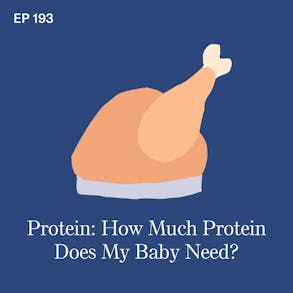
LISTEN TO THIS EPISODE
Episode Description
Why does protein hold so much POWER over parents?! Most adults eat too much protein and are obsessed with protein for all the wrong reasons…and we do NOT want to project this protein pressure onto our babies! In this episode we are exploring how much protein does your baby REALLY need to be getting from solid foods, what are the good sources of protein foods for babies and how do you know if your baby is eating enough or too much protein.
Links from this Episode
- Research articles mentioned in this episode: Koletzko, Berthold et al. “Lower protein in infant formula is associated with lower weight up to age 2 y: a randomized clinical trial.” The American journal of clinical nutrition vol. 89,6 (2009): 1836-45. doi:10.3945/ajcn.2008.27091
- Baby-Led Weaning with Katie Ferraro program with the 100 First Foods™ Daily Meal Plan, join here: https://babyledweaning.co/program
- Baby-Led Weaning for Beginners free online workshop with 100 First Foods™ list to all attendees, register here: https://babyledweaning.co/baby-led-weaning-for-beginners
Other episodes related to this topic:
- Episode 45: How to Balance Your Baby's BLW Plate
- Episode 110: Catch-Up Weight: Why Starting Solids Early Will Not Help Your Baby Gain Weight with Rosan Meyer, PhD, RD
- Episode 127: How Do Vegan Families Introduce Potentially Allergenic Foods? with @plantbasedjuniors Alexandra Caspero, MS, RD and Whitney English, MS, RD

Latest Episodes
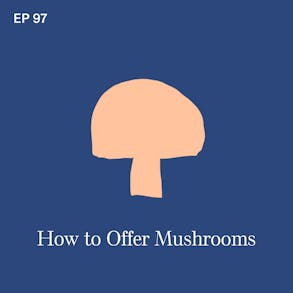
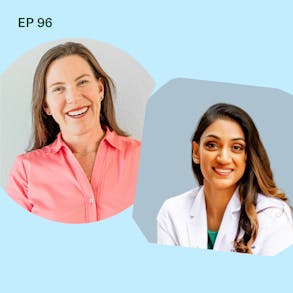
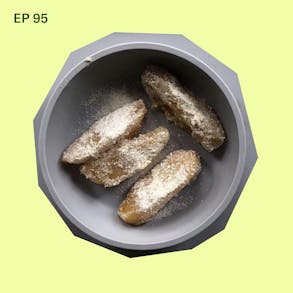
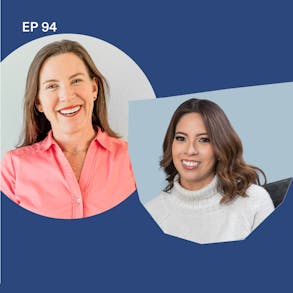

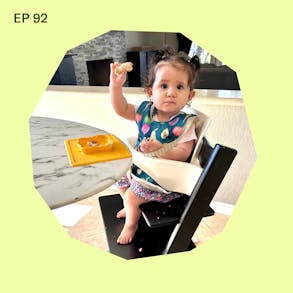
Katie Ferraro (0s):
So the problem with protein is that most adults themselves eat too much protein. And then we sometimes have problems with projecting like weird high protein diet stuff on the babies. The deal with babies is not only do they not need as much protein as much in the sink, but too much protein can actually be problematic. And here's why, Hey there Im Katie Ferraro Registered Dietitian college nutrition, professor and mom of seven specializing in baby led weaning here on the baby led weaning made easy podcast. I help you strip out all of the noise and nonsense about feeding, leaving you with the competence and knowledge. You need to give your baby a safe start to solid foods using baby led weaning.
Katie Ferraro (41s):
Hey guys, welcome back. We're talking today about protein and in particular, How Much Protein Does My Baby Need. And I can't believe I've never done a protein specific episode on the podcast before, because I actually do get a fair amount of protein questions from parents. Now, I like to start out these mini BLW training episodes with a B L w tip of the day. And so today's tip is if you think about all of the things that you're inclined to worry about when it comes to starting solid foods with your baby and in particular nutrition, protein is not a problem. If you walk away with nothing else from today's episode, I hope it is that you now no longer feel pressure about offering your baby quote, unquote enough protein hang tight because in today's episode, I'm going to show you exactly how minimal the amount of protein your baby really needs to eat from food is.
Katie Ferraro (1m 29s):
And once you see this quick calculation that we're going to do, that you can apply to your baby's particular age, you're going to realize like, oh my gosh, my baby is totally fine when it comes to protein. So let's dive in talking about protein and How Much Protein Does My Baby Need. I want to tell you guys a quick story, because I normally like to highlight only the positive things about baby led weaning, right? All the foods that Babies can eat. And I know that Baby led training gets a lot of bad rap sometimes as being a really judgmental space. So I've worked very hard to make my community a very positive and uplifting space. So we don't talk a lot about things. People shouldn't do. We tend to focus on the things that they can maybe should do, but I did just get an email from a mom that said, well, subject line Kito BLW diet should have deleted it right then.
Katie Ferraro (2m 12s):
But the message is basically from the mom, I'm on a keto diet and I want my baby to be keto. Now Babies can not, and should not be keto. Now in very, very rare medical situations, a ketogenic diet is actually therapeutically recommended, but you would be working with the pediatric dietitian. This is for children that have epileptic seizures, where we actually use the ketogenic diet therapeutically. This is a mom who's like purely ensconced in fad diet culture who wants to project that on her baby. So keto diet, as you know, is very high in fat and protein and very low in carbohydrate. And we don't mess with the carbohydrate mix of our baby's diet. So I politely wrote her back that that was very inappropriate recommendation and she would never find a Registered Dietitian who would help her with the keto diet because it's not appropriate for babies.
Katie Ferraro (2m 54s):
And if her baby had a medical need for a ketogenic diet, you should be working with a pediatric dietitian. So keto moms, you do you, but please do not do keto diets for your babies. Here's what we're going to cover today. We're going to talk about exactly how much protein your baby needs. And you'll see a keto diet would be completely inappropriate cause literally blow their kidneys up with that amount of protein. But I want to share how the protein needs change from the zero to six month phase. How they slightly go up from six to 12 months, but why you don't need to stress about filling that gap with food. We're also going to talk a little bit about the type of protein that's in formula compared to breast milk, but we're going to focus mostly on food, right? Cause you guys are here to learn about the food stuff. So what sort of protein can babies be eating?
Katie Ferraro (3m 34s):
How much do they need to be getting from food? How do we incorporate that into the diet? And then what's the problem. If we get too much protein. Cause when you walk away today, you're going to realize, oh too little protein is really not a problem in a neuro-typical equaled unquote healthy baby who is living in a developed country where there's enough protein, right? Because one of the problems in the developing world of course is there's the potential for protein-energy, malnutrition, meaning not enough protein and or not enough calories in many cases there's enough calories, but then there's not the right sort of protein there. So this conversation today is based on the assumption that you have access to a fair amount of protein foods and that you're not living in a situation of basically starvation, which is what protein energy malnutrition is.
Katie Ferraro (4m 17s):
So let's get started by looking at how much protein a baby actually needs. So if we look at the DRIs, those are the dietary reference intakes, okay. These are not the Bible per se, but it's like the best assumption and gathering of data that we have about what nutrient needs are for different age and gender populations. And when we look at babies at zero to six months and then seven to 12, when your babies zero to six months of age, we don't know specifically, like we don't really mess around with research to like try to purposely deprive babies of nutrients and see what it does to their body. Right? So a lot of this data, it's not absolutely concrete, but it's a good enough guesstimation and babies need about nine grams of protein from zero to six months pay.
Katie Ferraro (4m 59s):
And of course from zero to six months, babies only get breast milk and or formula. So you don't really need to worry about it because if you're giving the right amount of formula or feeding the right amount of breast milk, as evidenced by your baby, growing properly on the growth chart, you're doing fine. Let's look at seven to 12 months, that's a separate DRI category. The number of grams of protein goes from nine, which is zero to six months to 11. So seven to 12 months of age, your baby needs 11 grams of protein. Now the dietary reference intakes are protein devised on the intake of protein from breast milk for exclusively breastfed infants zero to six months of age. And I know some of you listening are like, that's not me. It kind of is though, because they, if you're not feeding breast milk than you're feeding infant formula. And while infant formula has higher amounts of protein compared to breast milk, it's an exact amount or calibrated that way because of the understanding that the protein from the cows milk base that's in the formula is not as effectively utilized by the baby's body.
Katie Ferraro (5m 52s):
Okay. But it basically kind of balances out to like, yeah, your baby's going to get that nine grams of protein that they from breast milk or formula from zero to six months at seven to 12 months of age, you need 11 grams. So basically your baby's protein needs go up by two grams of protein. And you're like, I don't know what two grams is, hang tight because we're going to get into that in a second. So for those of you who are in the seven to 12 month DRI category, okay, well how much protein is my baby getting from breast milk or formula? And if we look at you, let's say you're nine or 10 months old baby, most of them are having somewhere between 24 to 30 ounces of breast milk and or formula a day. If you're a formula fed baby that works out to about nine and a half to 12 grams that you're getting from breast milk or formula.
Katie Ferraro (6m 33s):
And if you're a breastfed baby, it's about seven to nine. So let's pick the number that's relating to both categories, nine grams of protein. Okay. If you have a nine or 10 month old, who's drinking around 24 to 30 ounces of breast milk or formula, that baby is getting, let's just say for rounding numbers sake, they're getting nine grams of protein. They need 11 grams of protein. So there is a two gram of protein difference. There that's basically how much protein babies need to be getting from foods. If you know anything about nutrition, you'd probably already stop listening to this episode. Like two grams of like, not even hard to do, like even if the baby's eating very little, they're getting two grams. And that's the point. Even at the nine month mark, most babies are still just on the cusp of, or have just kind of gotten the hang of self-feeding if you've been doing it for two or three months, usually like nine months is pretty sweet.
Katie Ferraro (7m 20s):
You're like, oh my gosh, finally, they're starting to eat a little bit better. And that's when you start to drop a milk feed. So you're going to be dropping some of that protein out from the milk, but it's okay because your baby is making up that gap by eating a little bit more. But even if you've been doing it for two or three months and your baby's not eating a ton, please rest assured that. Even if they're getting a little bit of food in their mouth, they're getting those two grams of protein that they need. Now, what sources of protein are good for babies? Okay. When I teach adult nutrition and have for years as a college nutrition professor, and we always focus for adults like adults eat too much protein, especially if you look at the typical standard American diet, sad, the sad diet, we eat too much protein and too much of that as animal protein.
Katie Ferraro (8m 1s):
Okay? So we always talk to adults about, you need to shift and eat less animal protein and focus more on plants for babies. You know, we've done enough education here. You guys are really aware of that. If you eat animal foods, like those foods have iron in those foods have zinc. And if you're okay with it, incorporate those in your baby's diet because that's where they get iron and zinc and vitamin B12 from having said that they don't need a ton of animal foods. Like you don't need to go keto for your baby. For those of you who are listening, who are vegetarians or vegans, certainly not my area of specialty. I would like to refer you to episode 127, where I had Alex and Whitney, the two registered dietitians who are plant-based juniors. They came on to talk about how vegan families can introduce certain types of animal foods.
Katie Ferraro (8m 42s):
Again, episode 127, Alex and Whitney. I send all my vegetarian questions. There they're fabulous resources for those of you who don't do animal foods. But we do, if you do do animal foods, want to incorporate a variety of animal and plant protein foods. So I've lots of different episodes, lots of different content about specific types of protein and how to make them safe for babies. But if you heard that two gram of protein thing and your link, but I don't know what that means. Let me just put it in context for you with an egg, okay? Unless you're vegan, you don't eat eggs, but most, even most vegetarians eat eggs, one egg, the egg yolk and the egg white together, six to seven grams of protein, depending upon what size you buy about four to five grams of that. So most of it is in the egg white and then about two or three is in the yolk. Depends how big the yolk is.
Katie Ferraro (9m 22s):
But the majority of the protein in an egg is in the white can we talked about in the other episodes, like when you're doing egg and we're introducing potentially allergenic food, you want to feed the white because that's where the protein is. But you also want to feed the yolk because that's where all the other good nutrients in the iron, the good fats are, et cetera. So let's say you're be like made a whole egg for your baby and you fried it and you broke the yolk up. So the yolk was distributed throughout the egg white. He flipped it over, you cooked it, you cooled it. You cut it into strips about the size of your adult pinky finger. And you fed it to your baby, six to seven grams in that egg. But most of you're like, yeah, but my baby does not eat the whole egg, but guess what? That's fine. Because in the whole day, your baby only needs to eat two grams of proteins. If you took that whole egg and you cut it into four strips and your baby got like half of that strip in their mouth, that would be like half of the protein that they need for the whole day from foods.
Katie Ferraro (10m 8s):
So again, the takeaway message here is please don't stress about protein. We put unnecessary emphasis on protein, especially as adults, especially if you look at typical weight loss and fad diet culture, there's this demonization of carbohydrates and protein and fat are fabulous. Okay. We per separate on protein. We focus on fat when it comes to babies, don't mess with the macronutrient mix. We want baby to have a variety of foods that contain carbohydrate fat and protein. So how do I incorporate protein on the plate? I did a whole episode, episode 45, which is about how to balance your baby's plate. And in that I talk about how, if you're using the easy-peasy mini-map okay. It's a three compartment suction mat with two, two ounce pockets and one, four ounce pocket.
Katie Ferraro (10m 50s):
I generally will put the protein food in the smaller of the two, the two ounce pocket. And even then I don't even fill the whole thing up. And I don't want you weighing your protein, especially my dietitian moms. I don't want you counting your grams of protein. It's not necessary. There are no set portion sizes for babies. The takeaway message here is very small portions for babies because they have a small stomachs and they're still learning how to eat. So don't put too much focus on protein cause what's the problem. If we do too much protein, okay. Babies have still developing immature kidney renal systems. Okay? You need fully functioning kidneys in order to process the high salyut load associated with a high protein diet. Okay? So we don't want to quote unquote, blow their kidneys out.
Katie Ferraro (11m 30s):
You're not at risk of doing that, but the point is they don't need a ton of protein. And even if you've forced fed them a ton of protein, they wouldn't be able to tolerate it. Another problem with too much protein is that it has the potential to displace other important nutrients, right? If you go way up on one of the macronutrients, the assumption is baby's only going to eat X amount of food. If you make most of the percentage of those calories, come from protein. They're not going to get enough fat for their important, still developing brains. And they're not gonna get enough carbohydrate, which is the body's preferred source of fuel. So don't mess with the mix, keep a little bit of protein, a little bit of fat, a little more fat than protein for babies, and then a little more carbohydrate. And then compared to the other two, like slightly more than 50% of the calories in a baby's diet should come from carb.
Katie Ferraro (12m 11s):
And I just mentioned that, cause some parents are like super of phobes and like, I don't want my baby having pasta or rice. It's like your baby needs to know how to eat a variety of carbohydrate containing foods. And my hundred FIRST FOODS list has 20 different starchy foods that are good sources of carbohydrate, but that's a different story because we're here to talk about protein, but also have a protein category in the a hundred FIRST FOODS list. And there's 20 proteins in there as well. And if you haven't grabbed that a hundred FIRST FOODS list and you want to work your way through the 20 carbs and the 20 proteins, we do five new foods a week, one new fruit, one new vegetable, one new starchy food. That's where you get the carbs. One new protein food. That's what we're talking about today. And then you also do a new allergenic food. Every week. I teach all about this and giveaway the a hundred FIRST FOODS list on my weekly workshop called baby LED WEANING FOR BEGINNERS.
Katie Ferraro (12m 54s):
Check that out at baby led, weaning.com. But back to too much protein, it can displace the other important nutrients. And the other thing about protein is it's a very satiating nutrient, right? Like if you're an adult and you're trying to lose weight and you don't want always feel hungry, you know, the dietitian will say, oh, you should have, you know, a slightly greater percentage of your calories coming from protein and not making fun of dietitians. I used to be an adult weight loss dietitian. You literally say like the same five things over and over again, but protein does make you feel fuller for longer, but we don't want to make our babies feel artificially full at the very time where we're trying to get them to grow into the phase where they're allowed to experience some casual hunger, their stomach needs to empty. So we don't want to make them feel full with protein and super high fat diets.
Katie Ferraro (13m 34s):
So there's the potential there to make your baby feel artificially full if you were to overdo it on protein. So what about the research that's out there about the effect of protein intake on end to end childhood development? There's two particular studies. We did a pretty deep dive lit review in preparation for this episode, two studies, I just want to mention real quick, both of which have similar findings, a relatively new study in 2021. This was a review study that looked at kind of the existing pot of data about protein and infancy and found that higher total protein intake during the first two years of life was associated with a subsequent higher BMI or potential for excessive weight gain. And the deal with protein is as this happens with parents or adults all the time, your body has no storage form of protein, right?
Katie Ferraro (14m 16s):
Like people that go to the gym, I love this and they burn 200 calories and they drink a 250 calorie protein shake. It's like, they think that that converts to muscle like your body does not store protein, right? Your body utilizes what it needs right now, which is a very small amount in your body and then converts the rest of that to fat. So if you overdo it on protein, your body just converts it to fat and stores it as fat. The same theory applies in infants. If we overdo it on protein, we see greater BMI's from age three to 10, according to this one particular review study and I'll link the two research studies that I'm mentioning today in the show notes for this episode, if you go to BLW podcast.com an older study, but it's still very well conducted. A very relevant study, found that looking at the higher protein intake content of infant formula.
Katie Ferraro (14m 59s):
Okay. And found that if you look at the different types of formula were out there that the higher protein content ones are associated with higher weight in the first two years of life. So higher weight, but had no effect on length. Okay? Cause sometimes parents mistakenly think I'm gonna, I want my baby to grow stronger, my baby to grow taller. So I'm going to give them more protein. Okay. That's not associated with length, but there is increase in weight. Meaning again, there's the potential for overweight and obesity with higher protein intakes. So takeaway message, overdoing it on the protein has no beneficial effect for your baby whatsoever. So one other episode that I want to refer you to, if you're interested in learning a little bit more about kind of these nuances of the micronutrients and how they affect infant growth, call back and listen to episode 110.
Katie Ferraro (15m 45s):
That was an interview that I did with Rosan Meyer. She's a PhD dietitian. She's like the guru of growth charts. And she talks a little bit about protein and how manipulating protein levels does not really help babies with their catch-up weight. And if you do have a baby who is underweight or has failure to thrive, or you've been told that your baby is growth faltering kind of use those terms interchangeably, depending upon where you are in the world, you do need to be working with a pediatric dietitian and they may adjust protein, but you don't do it Willy nilly on your own. And for those of you who have neuro-typical healthy developing babies, you don't need to worry about protein, a flip over the label of whatever food package you look at next. And look how much protein is in there. Even with very, very small amounts of food.
Katie Ferraro (16m 27s):
Your baby is certainly going to get the amount of protein that they need. Now we do need to acknowledge that the whole point of the weaning process is to gradually get less nutrition from milk and more nutrition from food. So as you drop the milk feeds and you drop the volume of milk, as you get closer to age one, the baby is by association going to and should be eating more. And then they're getting eventually more of their nutrition from protein. Okay. One thing we don't want to see though, is you turn into a toddler and you stick to like, you know, just like pure, soft, meltable easy to chew and swallow carbohydrates like pasta and crackers and white breads. There's not going to be enough protein in there and certainly not enough other nutrients. So start out when your baby is learning how to eat when you're in that honeymoon feeding phase between six and 12 months of age, when they'll really like and accept a wide variety of foods, work through the 20 different protein foods on my a hundred FIRST FOODS list.
Katie Ferraro (17m 19s):
But don't stress about protein because your baby is certainly getting enough, even with a few bites of food, if they're getting the right amount of formula or breast milk. Okay. And I always like parents to remember that during the weaning period, the majority of nutrition is still coming from breast milk or formula, particularly in the first phase of baby led weaning. So I hope that answered some of your questions about protein, checked out the other resources and research studies that I mentioned as well as the other episodes from this episode, if you go to the show notes, but you can find at blwpodcast.com/193, thanks so much for listening about protein and I'll see you next time.

The Program Baby-Led Weaning with Katie Ferraro
A step-by-step digital program for starting solid foods safely and navigating the original 100 FIRST FOODS™ meal plan with baby-led weaning.
 EXPERT-LED, PROVEN APPROACH TO EATING REAL FOOD
EXPERT-LED, PROVEN APPROACH TO EATING REAL FOOD CONCISE VIDEO TRAININGS TO MASTER BABY-LED WEANING
CONCISE VIDEO TRAININGS TO MASTER BABY-LED WEANING 100 FIRST FOODS DAILY MEAL PLAN WITH FOOD PREP VIDEOS
100 FIRST FOODS DAILY MEAL PLAN WITH FOOD PREP VIDEOS
Baby-Led Weaning for Beginners Free Workshop
Is your baby ready to start solid foods, but you’re not sure where to start? Get ready to give your baby a solid foundation to a lifetime of loving real food…even if you’re feeling overwhelmed or confused about this next stage of infant feeding.
Get baby-led weaning recipes and tips delivered to your email inbox.

